Stand up for the facts!
Our only agenda is to publish the truth so you can be an informed participant in democracy.
We need your help.
I would like to contribute

Wisconsin Lt. Gov. Rebecca Kleefisch and Gov. Scott Walker announced their re-election bids on Nov. 5, 2017. (Michael Sears/Milwaukee Journal Sentinel)
As Gov. Scott Walker runs for a third term, with at least half a dozen Democrats aiming to challenge him in the 2018 election, we’re reviewing promises the Republican made during the 2014 campaign -- including two big ones on taxes.
We use the Walk-O-Meter, which tracks Walker’s campaign promises and gives them one of five ratings: Promise Kept, Compromise, In the Works, Stalled or Promise Broken.
Going into this review, we’ve rated 49 percent of the governor’s pledges as Promise Kept, 19 percent as Promise Broken and the rest in between.
Here, we are updating our ratings on promises to cut property taxes and cut income taxes.
Both are likely to get attention as the campaign progresses.
Cut property taxes so that the levy on a typical home in 2018 is lower than it was in 2010
Walker made that promise in his "Continuing Wisconsin’s Comeback," a document from his 2014 campaign. We lasted rated it, in July 2015, as In the Works.
Walker has repeated the promise as recently as Oct. 23, 2017, in an interview on Fox News Channel’s "Fox & Friends" talk show.
We checked with Bob Lang, director of the Wisconsin Legislative Fiscal Bureau, the state’s nonpartisan scorekeeper. He told us:
The 2010 property tax bill for a median-value home -- often referred to as a typical home -- was $2,963, and his agency estimates the bill will be $2,824 in 2018. That’s a reduction of $139.
Lang said the actual amount for 2018 won’t be known until the spring of 2019 -- after Walker’s second term ends in January 2018 -- but that it would change little, if any.
Jon Peacock, director of the nonprofit Wisconsin Budget Project, told us that an important point to note is that under Walker, funding has been reduced for the state Homestead Tax Credit, which was designed to provide property tax relief to low-income homeowners and renters. The project estimates that as a result of the most recent reduction, done in the 2017-’19 state budget, about 11,400 households will see property tax increases averaging $614 per year.
With the property tax bill for a typical home projected to be lower in 2018 than in 2010, we rate this Walker pledge a Promise Kept.
Reduce income taxes so that they are lower in 2018 than they are today
Walker also made this promise in his 2014 campaign document.
We’ve previously noted these tax-cutting moves, among others, under Walker:
-
A 2014 law reduced the bottom income tax rate to 4 percent from 4.4 percent.
-
A manufacturing and agricultural tax credit that benefits corporations, but also business owners who file their income taxes as individuals.
-
Effective in 2016, a softening of the so-called marriage penalty, in which married couples filing their tax return jointly end up paying more in state taxes than they would if they filed as individuals.
Walker’s office pointed us to several other actions, including:
-
Eliminating the state's alternative minimum tax, which is mostly paid by upper-income taxpayers.
-
Conforming to the federal tax code, so that money individuals receive from their individual retirement accounts that is then donated to charity can be excluded from income for state income tax purposes.
-
Giving more preferential tax treatment to ABLE accounts -- savings accounts for people with disabilities.
Lang told us income tax collections in 2018 are estimated to be $319.5 million lower than they would have been without changes made under Walker.
The Wisconsin Budget Project argues that the tax cuts have disproportionately benefited higher-income people. Assessing 13 of the cuts in personal income, corporate income and property taxes approved between 2011 and 2016, the project estimates that the top 1 percent of residents by income — a group with an average annual income of $1.7 million — received 24 percent of the value of the tax cuts.
The promise itself, though, referred to taxes more generally. And with the 2017-19 budget complete, we have a clear picture of the tax changes that will take place during Walker’s term.
With income taxes lower in 2018, we rate this Walker promise a Promise Kept.
Our Sources
Interview, Wisconsin Legislative Fiscal Bureau director Bob Lang, Oct. 23, 2017
PolitiFact Wisconsin, "Projections based on new budget show promise is on track," July 17, 2015
PolitiFact Wisconsin, "Will progress early in second term hold? Stay tuned," May 2, 2016
Email, Wisconsin Budget project director Jon Peacock, Oct. 24, 2017
Email, Gov. Scott Walker spokesman Tom Evenson, Oct. 30, 2017
Wisconsin Budget Project, "Budget Bill Boosts Property Taxes for Thousands of Low-income Households," Sept. 14, 2017
Wisconsin Budget Project, "Missing Out Recent Tax Cuts Slanted in Favor of those with Highest Incomes," June 27, 2017




















